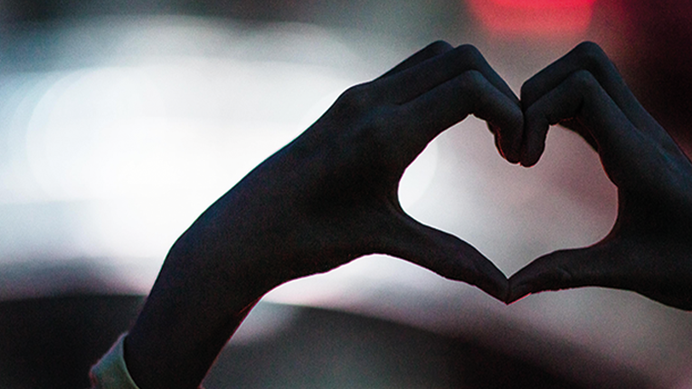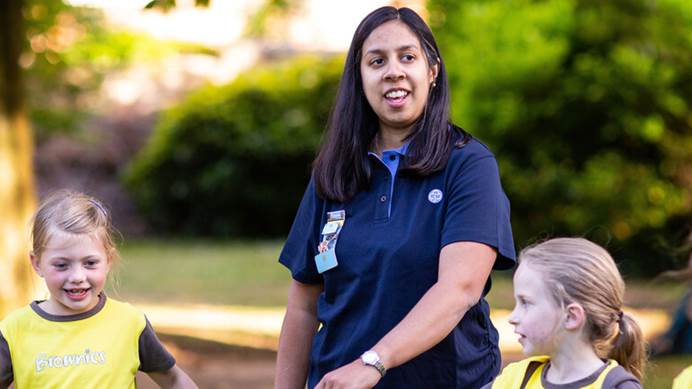Disabled members
How to support disabled members in guiding
According to a report from the Department of Work and Pensions, 7% of children are disabled - that’s more than 1 in every 20 children.
What do we mean by disability?
When we talk about disabled members, we also include members who have long-term conditions. Disabilities and long-term conditions can include, but aren’t limited to, mental health problems, physical impairments, sensory impairments, learning disabilities or long-standing medical conditions.
Examples might include:
- Diabetes.
- Autism and neurodiversity.
- Anxiety.
- Hearing impairment.
- Chronic pain.
- Asthma.
- Cerebral palsy.
- Visual impairment.
This isn’t a complete list, and it’s worth remembering that not all disabilities will be immediately obvious to you or to other girls in your unit.
Removing barriers
To include disabled members in our activities, we need to remove the barriers they experience. These barriers may be physical – like stairs can be a barrier to a wheelchair user needing to enter a building - but could be due to negative attitudes, prejudice or stereotypes. When we remove these barriers, disabled people can be fully included, have independence, choice and control.
The best thing I've ever done in guiding is learning to believe in myself. Guiding made sure that I viewed my wheelchair as my passport to life, not the end of my life,' Caroline, young member.
What you can do
You can take small steps to make a big difference to the guiding experience for disabled members.
Including disabled young members
Take a look at our good practice guidance for including disabled young members.
Making adjustments
By making adjustments, we can remove the potential barriers that disabled members face.
Adjusting activities
As a leader, it's important to adapt activities so that all girls can take part.
Our programme resources, including activity cards, skills builders, badge books and handbooks, are available in a range of accessible formats.
If a member needs these resources, please email [email protected].
One-to-one support
In some circumstances, a girl may benefit from one-to-one support to help her take part in guiding. This option should always be discussed with a young person and their parents or carers before being decided on.
Flexible transition ages
Some disabled young members can find it challenging to move to a new section, so we are flexible on the upper age range of each section, up to a member’s 26th birthday. This means disabled members can access the programme that's most appropriate for them and move on to the next section when they feel ready.
The decision about when to move up should be made in consultation with the young person and their parent/carer.
Promoting guiding to girls
Disabled girls may be less likely to consider joining a unit; they may be worried that guiding won’t be able to adapt activities to include them, or that they won’t have access to the same opportunities.
Promoting guiding to teachers, parents, carers and friends of disabled girls is always a good start. Explain that around 20,000 of our existing members are disabled or have long-term conditions.
Promoting guiding to potential volunteers
Find out what you can do to recruit disabled adults to your team, including flexible approaches to volunteering.
Support organisations
Contact these organisations for the most up-to-date information:
Disability Rights UK - disabled people-led organisation with guidance of making reasonable adjustments and information for disabled people to challenge discrimination.
Equality and Human Rights Commission - lots of information on the Equality Act 2010 and have issued detailed guidance for associations like guides (Girlguiding).
Mencap - the leading voice of learning disability.
The National Autistic Society - the UK’s leading charity for autistic people.
British Dyslexia Association - provides advice and support for dyslexic people of all ages, those surrounding them and the wider community.
The National Deaf Children’s Society (NDCS) - the leading charity dedicated to creating a world without barriers for deaf children and young people.
Royal National Institute for Deaf People - the largest charity for people with hearing loss in the UK.
Royal Society for Blind Children - providing a range of services for blind and partially sighted children and young people, their families, and the professionals who work alongside them.
Royal National Institute of Blind People (RNIB) - one of the UK’s leading sight loss charities and the largest community of blind and partially sighted people.
YoungMinds - the UK’s leading charity committed to improving the emotional wellbeing and mental health of children and young people.
Mind - a charity that provides advice and support to empower anyone experiencing a mental health problem, through campaigning, raising awareness and promoting understanding.
Rethink Mental Illness - improving the lives of people severely affected by mental illness through a network of local groups and services, expert information and successful campaigning.
Beat - the UK's eating disorder charity, working to support people affected by eating disorders, their family and friends.
Leonard Cheshire – disability charity supporting individuals to live, learn and work as independently as they choose, whatever their ability.
Scope – disability equality charity in England and Wales providing practical information and emotional support when it’s most needed.
Sense - leading charity for everyone living with complex disabilities and for everyone who is deafblind.
Diabetes UK - the leading charity for people living with diabetes in the UK.
Need more support?
For further support or information, please contact your commissioner or county adviser or email [email protected]
We also have an accessible guiding grant to help make guiding accessible for all members.



